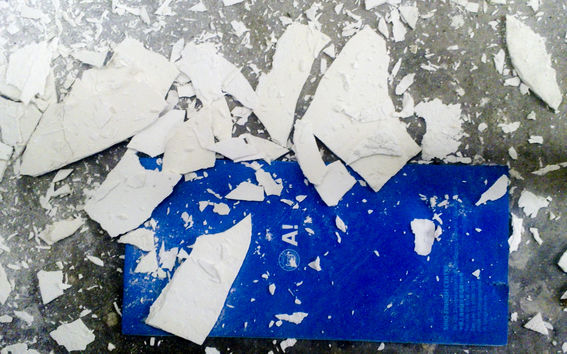The climate is changing - will education at Aalto change as well?

Almost one hundred discussions on climate change were organised around Finland on Erätauko Day on 29 January (‘Time out Day’). The discussions organised at Aalto University were based on Sitra's Timeout dialogue format. Students, teachers, researchers and professors from all Aalto University schools attended the events.
"The main idea behind the Erätauko Day is to bring together people who might not otherwise meet and enable a constructive discussion,” says Marja-Liisa Kakkuri-Knuuttila, emerita Professor of Philosophy of Management, who has been involved in developing the Time out discussion format.
Complex climate change
Achieving solutions for climate change is a multidisciplinary, joint project where no field or industry has sole ownership or can succeed alone. There is a lot of research in progress at Aalto University, which is motivated directly by climate change. However, the common view of the speakers at the discussions was that at present, climate change is not sufficiently visible in the education. The topic is referenced or gets a cursory mention in several courses, but climate change doesn’t feature as a deeper, more profound subject. There are a few new courses on climate change and sustainable development, but the numbers of participants are still limited.
The students felt that they wanted a broader perspective on Aalto's courses; how the skills taught on the courses relate to social questions, and in particular, to climate issues. At the moment, students are left pondering climate change questions quite much on their own, including in fields where links to climate change would be very clear.
Discussion participantThe starting point of education must be a world state where crises are real.
The state of the world as the starting point for education
In the discussions, an idea that a world where everything is possible no longer serves as a starting point for university studies became a key insight. A new starting point must be a world state where crises are real, and solutions are a requirement.
“Over the past 10-15 years, our world has changed radically. The effects of climate change have become visible and the speed of change has surprised even climate change researchers. We are suddenly in a situation where our old traditional teaching is no longer preparing us for working life where the main task is to meet and solve the challenges of a changing climate,” says Sanna-Liisa Sihto-Nissilä, Post-doctoral researcherfrom the Aalto University School of Science, who led the discussions.
Many of the paradigms in our society are changing when the limits of growth on our planet have already been reached. The need for economic growth is questioned, environmental concerns are at the heart of municipal and corporate activities, and sustainability has become a key part of the business environment. Subjects taught at Aalto University are crucial to climate change solutions, but also vulnerable to the changing paradigms of the economy. We live amid many unanswered questions.
“The task of universities is to act as society’s pioneers and visionaries. That is why universities should feel special pressure to provide education that responds to today’s and future’s most pressing problems,” said a student who participated in the discussion.
"Education must change but change needs a leader. Many teachers in Aalto see the need for change, but they require someone or something else to implement it. Teachers need additional support on how to embed themes on climate change into their courses,” one participant summarised.
Getting dialogue into education
The dialogue discussions generated a strong message for the university. Aalto could really lead the way; managing complexity and open questions and providing multidisciplinary knowledge and skills for these situations so that knowledge and learning become solutions to combat climate change. The multidisciplinary nature of Aalto University is a strength and, for example, introducing the role of art in understanding and communicating change could form a new platform for cooperation on climate change.
“It was great to talk to people from different fields and hear their views. Representatives from the field of art and physics rarely find themselves in the same discussion panels,” said a doctoral student from the Aalto University School of Arts, Design and Architecture.
Using dialogue as a working method also sparked interest in the participants. Lots of people left the discussions feeling inspired to tackle the topic of climate change again and to use the dialogue method at their own courses.
This article is based on the insights that the people who participated in the Aalto Erätauko dialogues recorded after leaving the discussions. These and other insights from other Erätauko dialogues organised in Finland are available on Sitra's website (www.eratauko.fi). The summary of Aalto University's Erätauko dialogues will be submitted to the Sustainable Development Education Working Group, set up by the Vice President for Education.
More information:
Sanna-Liisa Sihto-Nissilä
Post-doctoral researcher
Aalto University
sanna-liisa.sihto-nissila@aalto.fi
StudentUniversities should feel special pressure to provide education that responds to today’s and future’s most acute problems.
Read more news

Join the Unite! Virtual Education Summit- Registration now open
Join us in shaping international collaboration! This online event takes place 12 March, 2026.
Apply Now: Unite! Visiting Professorships at TU Graz
TU Graz, Austria, invites experienced postdoctoral researchers to apply for two fully funded visiting professorships. The deadline for expressions of interest is 20 February 2026, and the positions will begin on 1 October 2026.
Elina Pyylampi wants to combine renewable energy solutions and commerciality
The first-year student in Electrical Power and Energy Engineering wants to work with renewable energy and electrical systems.






